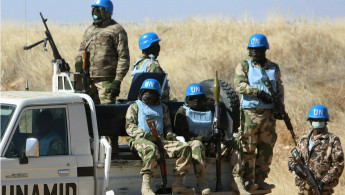Sudan 'blocks' UN access in Darfur fighting areas, as peacekeeping drawdown continues
Sudanese forces in Darfur have blocked UN personnel from reaching areas where fighting has displaced thousands of civilians, the inter-government agency said on Thursday.
Intense fighting between Sudanese forces and the Sudan Liberation Army-Abdul Wahid rebel group rocked the Jebel Marra mountains of Darfur, despite a ceasefire unilaterally announced by Khartoum in March.
"The continued fighting is deplorable and should stop immediately, while unhindered access should be granted to enable humanitarian aid agencies to reach the affected population," said Jeremiah Mamabolo, the head of the joint African Union-United Nations peacekeeping mission in Darfur (UNAMID).
"Attempts by UNAMID to verify the situation on the ground have been blocked, with government forces denying mission personnel access to areas of conflict," the statement said.
The UN is looking to further scale back its peacekeeping mission in Darfur as the agency deals with continued budget cuts.
Twitter Post
|
UN peacekeeping chief Jean-Pierre Lacroix said earlier in June that the latest plan calls for the number of troops to be reduced from 8,735 to 4,050 by June 2019, while cutting the police force to 1,870 from its current level of 2,500.
The Security Council agreed last year to trim the UNAMID mission - once among the biggest and costliest of all peace operations - as the United States pressed for budget cuts to peacekeeping.
UN peacekeepers now plan to focus their efforts on Jebel Marra area where fighting continues.
The council is scheduled to vote on 28 June the latest proposed cuts to UNAMID.
"The UN's proposed cuts would effectively end the peacekeeping mission's core human rights and protection role in most of Darfur," said Mausi Segun, Africa director at Human Rights Watch. "Everything we know about Darfur indicates a pressing need for human rights monitors to continue their work," he added.
War monitors and analysts have also criticised what they say are false equivalences between rebel fighters and government forces and its allies, who they say target villages and civilians.
The conflict in Darfur erupted in 2003 when ethnic African rebels took up arms against Sudan's Arab-dominated government, accusing it of apartheid. Khartoum now insists that the conflict has ended in Darfur.
Deployed in 2007, UNAMID once had 16,000 blue helmets on the ground tasked with protecting civilians.
The United Nations says that over the years the conflict has killed about 300,000 people and displaced more than 2.5 million, with many having set up home over the last decade and a half in sprawling semi-permanent camps.
Agencies contributed to this report.





 Follow the Middle East's top stories in English at The New Arab on Google News
Follow the Middle East's top stories in English at The New Arab on Google News
![The UAE is widely suspected of arming the RSF militia [Getty]](/sites/default/files/styles/image_330x185/public/2024-11/GettyImages-472529908.jpg?h=69f2b9d0&itok=Yauw3YTG)
![Netanyahu furiously denounced the ICC [Getty]](/sites/default/files/styles/image_330x185/public/2024-11/GettyImages-2169352575.jpg?h=199d8c1f&itok=-vRiruf5)
![Both Hamas and the Palestinian Authority welcomed the ICC arrest warrants [Getty]](/sites/default/files/styles/image_330x185/public/2024-11/GettyImages-2178351173.jpg?h=199d8c1f&itok=TV858iVg)